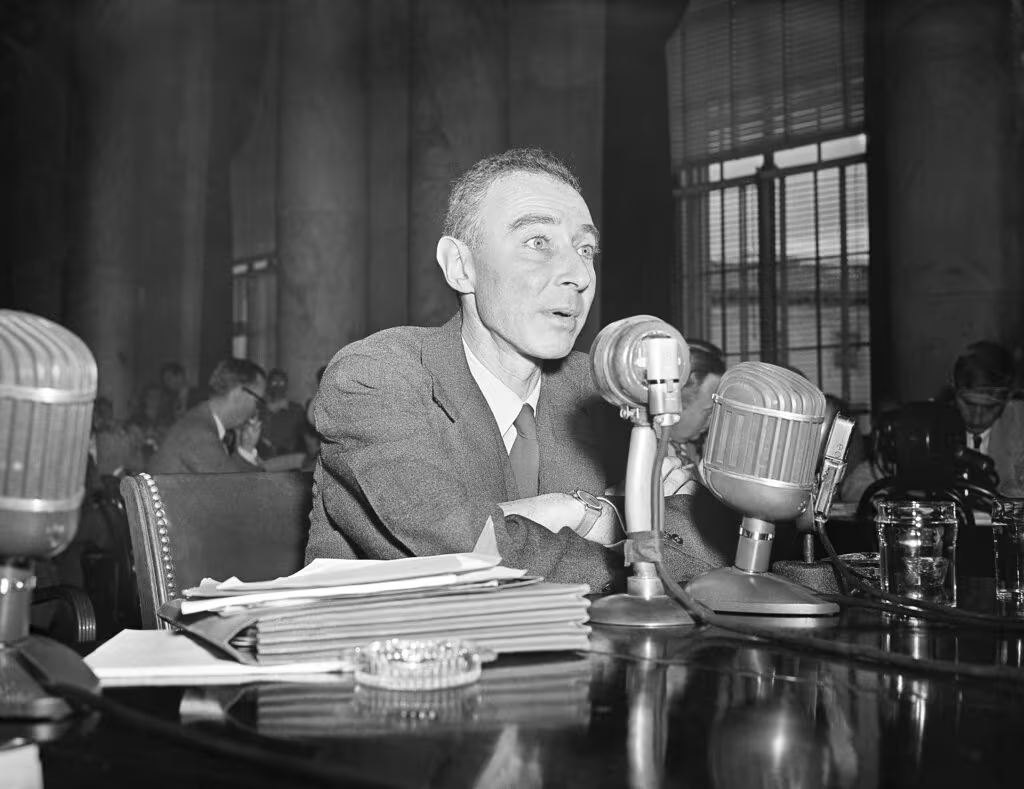How To Decontaminate J. Robert Oppenheimer’s Own Political Radioactivity
The way to greet the new film on the ‘father of the atomic bomb’ is to release the files on him that have been kept secret for generations.

On July 21, the biopic “Oppenheimer” will drop in theaters. It dramatizes the story of “the Father of the Atomic Bomb,” J. Robert Oppenheimer. The film is being criticized for a lack of racial diversity. Far more problematic is its whitewashing of the physicist’s communist sympathies.
In the movie, Oppenheimer is called “the most important man who ever lived,” an absurdity unmatched in Hollywood razzle-dazzle but one that is gaining traction as the zeitgeist moves left, popularized by such bizarre fiction as “real communism has never been tried.”
Oppenheimer not only tried communism, he liked it, but with so many caught up in the fight during the 1950s, the impulse is to assume that the scientist was unjustly smeared the way, say, Lucille Ball was, joining the Communist Party at her grandfather’s urging, not out of any anti-American zeal.
Despite these questions, the Secretary of Energy, Jennifer Granholm, vacated in December the 1954 decision revoking Oppenheimer’s security clearance. She presented it as righting a wrong perpetrated by the Atomic Energy Commission’s “flawed process.”
Will “Oppenheimer” try to do for its subject what 2014’s “The Imitation Game” did for the British genius, Alan Turing, who cracked the Nazi’s Enigma Code only to be prosecuted for homosexuality years later, a crime for which he was in 2013 pardoned by Elizabeth II?
Like Turing, who used his intelligence to defeat Germany, Oppenheimer created the bomb used to defeat Japan. Yet Turing didn’t join his home country’s branch of the Nazis — as Oppenheimer did the Communist Party.
There’s always the chance that Soviet reports were invented to appease superiors, but if documents released from their archives are to be believed, Oppenheimer was not only a sympathizer but a spy who helped the Kremlin split the atom, sparking the nuclear arms race.
A 1944 letter from the USSR’s commissar for state security, Boris Merkulov, to their feared commissar for internal affairs, Lavrenty Beria, is damning. It says Oppenheimer was an “unlisted member” of the Communist Party USA, meaning he kept his name off the list. Oppenheimer, Merkulov wrote, “informed us about the beginning of work” on the bomb and “provided cooperation in access to research.”
According to two historians, Jerrold and Leona Schecter, writing at the Wilson Center, Oppenheimer is also “mentioned as an unlisted member of the American Communist Party in a Soviet intelligence document.” The scientist had been a party member since the 1930s, but would have concealed ties for purposes of espionage.
Cold War-era files on Oppenheimer “in Soviet Intelligence Archives and the Presidential Archives remain under seal,” the Schecters write, adding that President Putin “admitted on CNN … that American scientists cooperated in Soviet atomic espionage, but he did not name names. Russian intelligence still protects its assets.”
If Oppenheimer was a Kremlin cat’s paw, it would explain why, at the Potsdam Conference in 1945, Stalin reacted with a shrug when President Truman told him about the new superweapon. The dictator’s reaction surprised the Yanks.
According to the Atomic Heritage Foundation — a nonprofit “dedicated to the preservation and interpretation of the Manhattan Project and the Atomic Age” — Truman’s delegation was “unaware that Stalin had already known about the American effort to build an atomic bomb via the Soviet spy network. In fact, Stalin had known about the existence of the Manhattan Project for longer than Truman.”
Few people could have fed Stalin such information, and Oppenheimer was one. This circumstantial case casts a different light on Ms. Granholm’s presumption to “correct the historical record and honor Dr. Oppenheimer’s profound contribution.”
In an editorial marking these concerns, the Sun in December made a point of saluting Oppenheimer’s role in our victory in World War II. “The left-wing physicist,” we said, “played a heroic role in enabling us to defeat the Japanese Empire and save the countless American lives that would have been lost in a conventional attack.”
This muddled picture will have to be reflected in some measure on the screen, but it’s one the Biden Administration can clear up by releasing all the Oppenheimer files and pressuring the Russians to do the same. Until the full record is public, arguments about whether Oppenheimer was a patriot or spy will rage, and it will be impossible to know if there’s fire or just lots of radioactive smoke.

